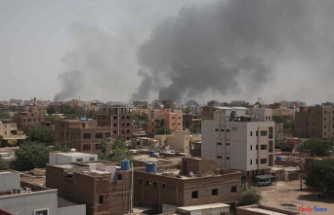Prime Minister Abiy Ahmed would like to make self-sufficiency in wheat a symbol of modern Ethiopia, against the backdrop of the project to erase from memory the image of a country often associated with humanitarian aid campaigns to fight against starvation.
Since coming to power in 2018, the Nobel Peace Prize winner has made it one of the priority areas of his policy. “We have turned the dream of a wheat-exporting Ethiopia into a reality,” he boasted on February 12 from a brand new warehouse built in the fertile area of Bale, Oromia region.
An exaggerated assertion, not to say erroneous. The major communication campaign in which he has embarked is struggling to make people forget that the worst humanitarian situation in the world is currently in the country, according to United Nations figures. Increasing wheat production alone cannot alleviate the deep crisis in this country of 115 million people.
The civil war in Tigray in which Abiy Ahmed was accused of using food deprivation as a weapon of war, guerrilla warfare in the Oromia region and the worst drought in four decades have left 20.4 million Ethiopians in dire straits. food insecurity. That is almost one in four inhabitants.
"A very unrealistic target"
In this country where teff is king – the cereal that traditionally makes up the injera pancake and local beers – Abiy Ahmed is betting on wheat, which is cheaper to grow. Ethiopia is the leading producer in sub-Saharan Africa. Since 2019, the authorities have redirected millions of birr in investments towards irrigation, mechanization and seed improvement projects.
Ethiopia has tripled its area under irrigated wheat, from 400,000 hectares to 1.3 million hectares, in particular by bringing farmers together in farming groups. The country would have harvested 7 million tons in 2022, according to the African Development Bank (AfDB), against 4.6 million tons in 2019. And, according to the deputy minister for agriculture, Mélès Mekonnen, this year's harvest will fully cover Ethiopia's needs, which amount to approximately 9.7 million tonnes.
Optimistic, Addis Ababa claims that 2023 will be the first year that the country will not import wheat from abroad. "It's a very unrealistic target in this time frame and with the limited capacities of Ethiopia", judges on the contrary a study by the United States Department of Agriculture, published in 2022, which doubts the figures. put forward by the authorities. Ethiopia still imported 1.6 million tonnes in 2022.
In search of solutions to solve the shortage of foreign exchange, Abiy Ahmed actually wants to make wheat a machine to earn dollars. According to the Prime Minister, Ethiopia is about to export its cereals to the sub-region: to Kenya, Djibouti and Sudan.
"Price not competitive enough"
"The idea of the Ethiopian export program is not based on economic models, it is above all a diplomatic tool for Abiy Ahmed", confides an official of the ministry of commerce and regional integration, who wishes to keep the 'anonymity. Assuming that several East African countries wish to buy Ethiopian wheat in the future, "there are currently no transactions or buyers in the region", adds Gerald Masila, director of the East Africa Grain Council . And "the price of Ethiopian wheat is not competitive enough with cereals imported from Russia, the United States and Ukraine," he concludes.
Would Abiy Ahmed prioritize his ambitious export agenda at the expense of Ethiopian consumers and farmers? "We are paying the price so that the government can one day carry out its exports", annoys Tolosa Ayele, a farmer from around the capital Addis Ababa, who is alarmed by this "unfair" policy.
Ethiopian authorities force some 1.3 million wheat farmers to sell directly to government-run cooperatives, which then oversee distribution. Problem: The purchase price paid by the government is below market rates. So much so that tens of thousands of farmers refuse to sell their crops to him.
Tolosa Ayele has been storing her wheat on her farm for weeks, waiting for better days. "If I sell my wheat to the government (0.56 euro per kilo), I don't know if I will be able to plant next season. I'm waiting for them to raise their purchase price," he said. Indeed, the price offered does not take into account galloping inflation, and in particular that of gasoline and agricultural fertilizers.
The paradox is total. An Ethiopia meant to become a grain empire is experiencing shortages in its own cities. In the best of cases, wheat is bought on the black market (1.20 euros per kilo). In the worst case, it leads to the temporary closure of bakeries. "It's amazing, despite what the government tells us, wheat is now twice as expensive as in previous years!" exclaims Awelu Mohamed, a grocer from central Addis Ababa.
" Two birds with one stone "
While waiting to be exported to East Africa one day, Ethiopian wheat is sold to foreign organizations operating in Ethiopia. The World Bank bought the equivalent of 60 million euros from Addis Ababa in early March. As for the World Food Program (WFP), it must acquire 35,000 tons of it to be able to distribute it in areas that need food assistance.
A government spokesperson, Legesse Tulu, welcomed a "first in which Ethiopian citizens receive humanitarian aid while allowing the government to earn foreign currency through the export of wheat." "Isn't that called killing two birds with one stone?" “, he joked cynically on his Facebook account, before withdrawing his message from the platform. The business is indeed lucrative. The operation brought in 200 million dollars (185.7 million euros) to the State.
But it is not yet sufficient for non-governmental organizations (NGOs) to pass on hundreds of thousands of tons of cereals, notably from Ukraine and the United States. Much to the chagrin of Prime Minister Abiy Ahmed, who in November compared international food aid to "a dangerous painkiller that the country easily becomes addicted to" and which Ethiopia must do without.












